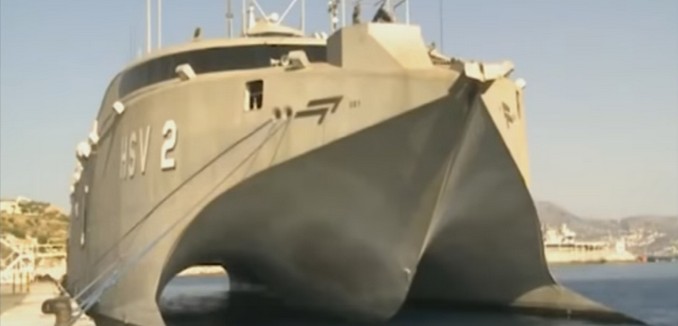Rockets fired by Iran-backed Houthi rebels in Yemen struck and badly damaged a United Arab Emirates ship traveling through a strategic Red Sea waterway on Saturday, the Long War Journal reported.
U.S. officials told Fox News on Monday that the weapons used in the attack were supplied by Iran.
The Bab-el-Mandeb Strait is a strategic chokepoint between the Red Sea and the Gulf of Aden. More than 4.7 million barrels of oil passed through the waterway daily in 2014.
The UAE is a member of the Saudi-led anti-Houthi coalition, which has been seeking for the past two years to recapture the capital Sanaa from the rebels and restore deposed Yemeni President Abbed Rabbo Mansour Hadi to power. The United Nations has identified Yemen as a “humanitarian crisis,” reporting that more than 10,000 people, including 3,800 civilians, were killed between March 2015 and August 2016.
The UAE foreign ministry stated that several crew members were injured during the incident, though none were killed. The UAE called the attack an act of terrorism. The UN Security Council also condemned the attack, as did the U.S. State Department, which asserted that the U.S. “remains committed to upholding freedom of navigation through the Bab al-Mandeb.” The U.S. Navy subsequently deployed three war ships to the strait: the USS Mason, the USS Nitze, and the USS Ponce. The Ponce can deploy special operations forces as necessary.
Iran’s extraterritorial militia, the Islamic Revolutionary Guard Corps (IRGC), has reportedly been supplying the Houthis with both rockets and missiles. U.S. forces have intercepted at least four arms shipments from Iran to Yemen, including most recently in March.
Secretary of State John Kerry expressed concern over the shipments in August, calling them “not a threat just to Saudi Arabia; it is a threat to the region, it is a threat to the United States, and it cannot continue.”
Iran, and specifically the IRGC, has also stepped up its aggressive naval behavior in the Persian Gulf.
Ten American sailors and their two boats were seized by IRGC naval forces in January of this year in violation of international law. Iran portrayed their capture as a victory against the U.S., releasing the sailors after claiming that Washington apologized for the incident. Khamenei proclaimed that the naval forces who captured the sailors did “God’s deed” and issued medals to the commanders involved, while the IRGC announced plans to build a statue to commemorate the seizure.
In May, the IRGC’s deputy commander threatened to close the Gulf’s strategic Straits of Hormuz to the U.S. and its allies if they “threaten us,” adding: “Americans cannot make safe any part of the world.”
The U.S. Navy reported last month that there were nearly 300 encounters or “interactions” between American and Iranian naval vessels in the Persian Gulf in 2015. While most of the encounters were not considered to be harassment, the behavior of the Iranian navy was found to be less disciplined than that of other navies. Lt. Forrest Griggs, the operations officer of the USS New Orleans, explained that risks arise from the unpredictable behavior and uncertain intent of the Iranian vessels. “It’s very common for them to come up to within 300, 500 yards of us, and then they’ll turn, or parallel us and stop,” he told Fox.
Vice Adm. Kevin Donegan, the commander of the Navy’s Fifth Fleet, observed in November that Iran’s “malign behavior” at sea had not changed since the announcement of the nuclear deal four months earlier.
[Photo: R&U Vid / YouTube ]




